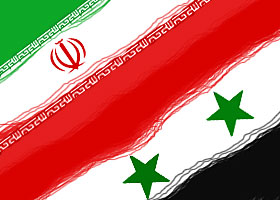 Iran has fired another shot at the US over the Syrian and Iraqi crises, claiming that the Islamic States offensive against Kobane a Kurdish center in northern Syria proves the incompetence of the American-led coalition against the jihadists.
Iran has fired another shot at the US over the Syrian and Iraqi crises, claiming that the Islamic States offensive against Kobane a Kurdish center in northern Syria proves the incompetence of the American-led coalition against the jihadists.Ali Shamkhani, the Secretary of the National Security Council and the official overseeing Irans political maneuvers in Syria and Iraq, made the statement to former French Foreign Minister Dominique de Villepin on Tuesday:
The situation [that] the Kurdish city of Kobani in northern Syria is currently faced with, is a clear proof of the ineffectiveness of the coalition [formed by] the West and certain countries in the region under the pretext of fight against terrorism, Shamkhani added.
He added the implicit warning that the US should withdraw support from Syrian insurgents seeking overthrow Irans ally President Assad: Ignorance of the countries right of sovereignty and irresponsible measures by the so-called anti-terrorism coalition and certain regional countries will further complicate the fragile security and political conditions in the region.
Prominent MP to Rouhani: Free Detained Opposition Leaders Or Ill Summon You To Parliament
Prominent conservative MP Ali Motahari, in a letter to Hassan Rouhani, has called for the release of detained opposition leaders Mir Hossein Mousavi and Mehdi Karroubi.
Motahari has said for months that the two men both candidates in the disputed 2009 Presidential election won by Mahmoud Ahmadinejad but this time he added the demand that those responsible for their 44-month house arrest be punished.
And the MP said that, if Rouhani did not act, he would summon the President to Parliament for an explanation.
There has been a wrong tradition in the recent years of the Islamic Republic imposing house arrest on its famous and popular opposition figures, Motahari said.
Javan Newspaper, affiliated with the Revolutionary Guards, has responded by calling Motahari and illiterate and a member of the sedition movement.
Rouhani: Consensus on Principal Nuclear Issues With 5+1 Powers
President Rouhani has tried reassurances over the state of the nuclear talks with the 5+1 Powers (US, Britain, France, Germany, China, and Russia), saying there is consensus between the country and the five permanent members of the UN Security Council plus Germany (P5+1) on the principal issues.
The latest set of talks between the two sides ended on September 27 in New York, after 10 days of negotiations. They are seeking a comprehensive agreement before the expiry of interim arrangements on November 24.
Iranian negotiators said there were still significant gaps on issues such as Tehrans number and level of centrifuges for enrichment of uranium.
However, Rouhani told Cabinet members and MPs on Tuesday:
There is no difference between the two sides over whether a power plant should be constructed in Arak [site of a heavy-water nuclear reactor], or whether Iran should possess enrichment technology, or about the Fordoo center [for uranium enrichment] and the continuation of Irans peaceful nuclear activities, or whether alleged military issues should be resolved; and there is difference only about details and the quantity of matters.
However, the Supreme Leaders top aide, Ali Akbar Velayati, took a far harder line in a meeting with French Foreign Minister Dominique de Villepin:
We have been very clear and the Supreme Leader has been very clear about our position .We will not abandon our principles in the nuclear talks.
Foreign Minister Mohammad Javad Zarif was also downbeat in his talk with de Villepin:
The talks have reached a critical stage and Iran has put many proposals on the table, now the other side has to show their determination to reach an agreement. Unfortunately greed by some of the opposing members has prevented reaching an agreement.
Speaking at Tehran University, Rouhani also pressed again for Irans inclusion in campaigns against the Islamic State in Iraq and Syria:
All countries have said that Iran should play its role in fighting terrorism and there is no doubt about this .
Fortunately, Iran is the regions stable country and has always provided support for the regional countries, especially Iraq, Syria, Lebanon and Afghanistan, and God willing, we will continue to support them in a bid to make the region stable,
By EA WorldView
The Iran Project is not responsible for the content of quoted articles.










